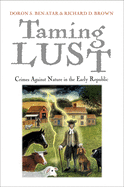 First up this week is an interview with Doron S. Ben-Atar and Richard D. Brown about their book, Taming Lust: Crimes Against Nature in the Early Republic (University of Pennsylvania Press) on New Books in Law.
First up this week is an interview with Doron S. Ben-Atar and Richard D. Brown about their book, Taming Lust: Crimes Against Nature in the Early Republic (University of Pennsylvania Press) on New Books in Law. New Books in History interviews Luke Harlow about his new book, Religion, Race and the Making of Confederate Kentucky: 1830-1880 (Cambridge).
The Guardian has a review of Penny Loaves and Butter Cheap: Britain in 1846 by Stephen Bates (Head of Zeus).
"Eschewing any great ambition to shake the standard accounts of one of the great set pieces of British constitutional history, Bates does a sturdy job of providing an introduction to the key personalities and positions of the day."The Washington Post has a list of the "Five best books by American presidents", including Theodore Roosevelt's history, The Naval War of 1812.
H-Net has posted a review of Hilary McD. Beckles's Britain's Black Debt: Reparations for Caribbean Slavery and Native Genocide (University of West Indies Press).
"This book will appeal to political leaders, legal scholars, academics, and activists engaged in the reparatory justice movement through its insightful observation that the legacies of the colonial paradigm do not lie quiescent in the past, but are galvanized in current discursive and institutional practices of racism, destitution, and exploitation."H-Net also has a review of Mary Jane Warde's When the Wolf Came: The Civil War and the Indian Territory (University of Arkansas Press), "a complete study of the Civil War in the Indian Territory that should have a place on your bookshelf."
For those looking for some poetry to read this summer, the recent SCOTUS cell phone decision has inspired NPR to make Tape for the Turn of the Year: A Poem (Norton & Co.) by A.R. Ammons "this week's must read."
"Privacy advocates cheered the unanimous ruling. The police weren't so psyched, fearing it would make their work harder. Basically, the Court decided that the Founding Fathers had never anticipated carrying one's whole life in a handheld device, and so that device deserved the same privacy protection the Founders had fought so hard for.Salon has an excerpt from America and Britain: Was There Ever a Special Relationship? by Guy Arnold (Oxford University Press).
But literature has another answer, an odd one I'll admit, that also involves a handheld device called a book. Some writers protect their privacy by hiding in plain sight."

